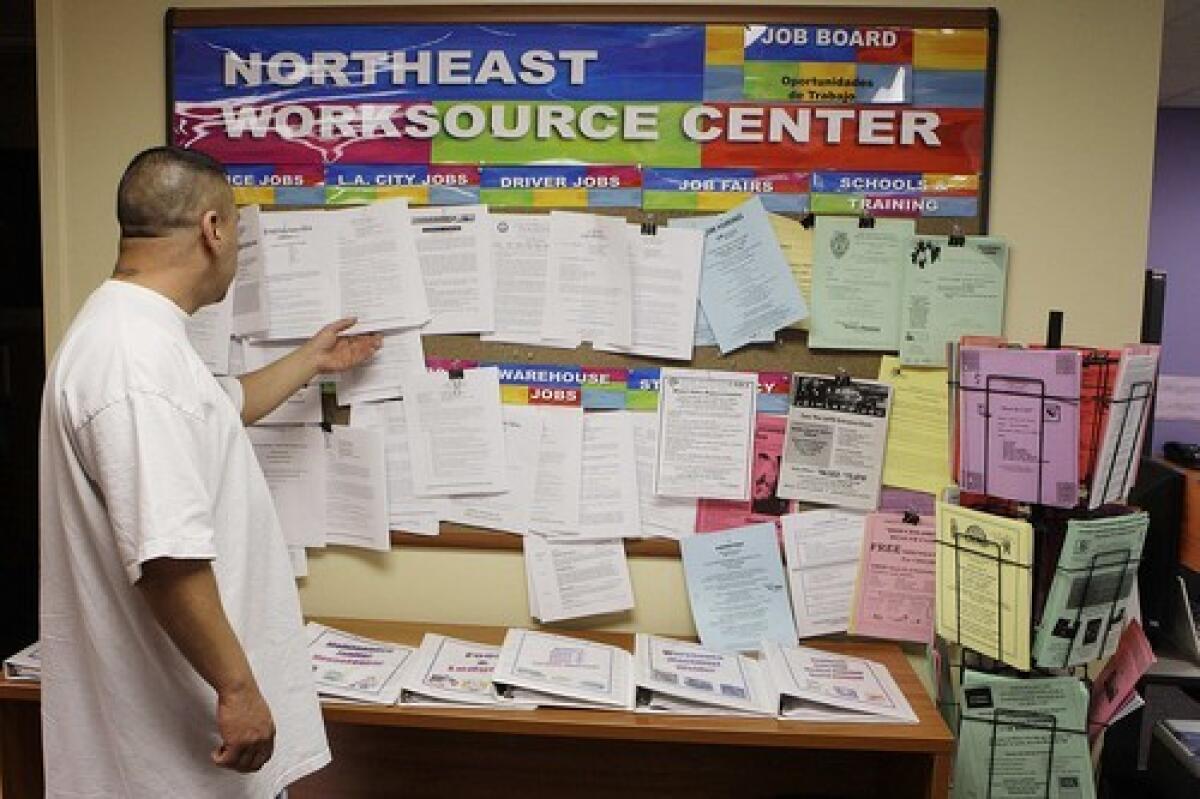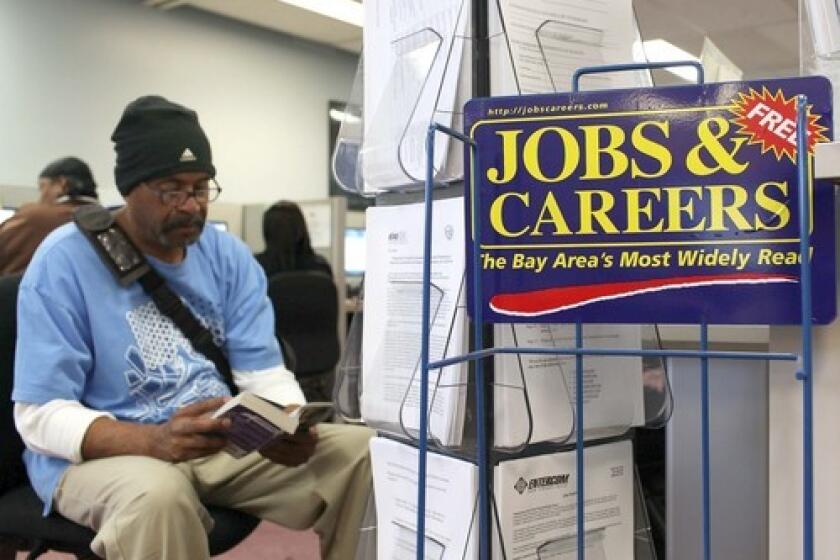California’s troubled unemployment agency needs immediate overhaul, report says

- Share via
SACRAMENTO — California’s antiquated unemployment benefits system requires a complete overhaul to overcome significant problems that have delayed getting money to many left jobless during the COVID-19 pandemic, a strike team appointed by Gov. Gavin Newsom said Saturday.
The 45-day review by technology and government experts found that the backlog of unresolved claims at the state Employment Development Department is growing rapidly, by 10,000 a day, and — although Newsom wanted it eliminated by the end of this month — will take several more months to be cleared.
The report was requested by Newsom in July after months of complaints from unemployed Californians frustrated with the state agency for failing to process claims, leaving them without the benefits needed to pay their bills. The EDD has also come under fire from state legislators, who last week approved an emergency audit of its performance in response to the criticisms and following reports of widespread fraud in the unemployment system.
“No matter how common this situation may be, it is unacceptable,” the strike team said in its report, noting that other states are also being overwhelmed with unprecedented numbers of claims for unemployment benefits. “The state must deliver this benefit to those who qualify within a time frame that’s relevant to the well-being of the claimant, and it was failing to do that for too many Californians.”
The report, which was supposed to be released last Monday and was instead issued late Saturday evening, recommends long-term and immediate fixes at the EDD that would help those who are out of work get faster help online or by phone to resolve problems that have bogged down more than 1.5 million claims.
“With this road map, EDD is already on their way to meeting claimants’ needs faster, and I’m confident that over time the department will continue to improve the experience people have filing for unemployment insurances,” said Jennifer Pahlka, co-leader of the strike team and the founder of the Code for America, a group that seeks to improve the public’s access to government services through digital technology. That group was not involved in the effort. The other team leader is Yolanda Richardson, secretary of the state Government Operations Agency.
Many people who lost jobs or income in California due to coronavirus say they have been unable to get the benefits for which they are eligible.
Assemblyman David Chiu (D-San Francisco), a leading critic of the EDD, said the report is helpful but the facts about the agency’s performance are discouraging.
“The report documents how EDD has failed the people it serves in almost every imaginable way,” Chiu said. “The size and scope of the backlog are shockingly large.”
The 109-page report lists more than 100 recommendations, including one the state says is already in the works: the creation of a streamlined identity verification process that is expected to be ready by Oct. 5 and would enable 90% of applications to be approved online in as little as a few weeks. Currently, 40% of all applications must be manually processed to verify the identity of claimants and guard against fraud, which can take months to complete.
Under the current system, if the EDD cannot verify a person’s identity when the first claim is filed, the agency mails a notice giving the applicant 10 days to submit two forms of identification, including a copy of a driver’s license or passport. Those documents can be uploaded online but are later manually processed in the system by EDD workers.
If information in the documents is different from what is on the claim — such as a different birth date or spelling of a name — that can trigger a more lengthy process, and those who don’t reply within 10 days can have their claim denied, further delaying the process.
A report released by EDD in July found that 87.8% of claimants saw initial payments within 14 calendar days in March, but by June the number had dropped to 51.9%.
EDD director Sharon Hilliard voiced support on Saturday for the recommendations of the strike team in a letter to the governor and said she was working to “ensure our customers are provided their benefits they deserve in a timely manner.” She estimated there are more than 1.5 million unresolved claims in the backlog.
On the recommendation of the strike team, the EDD has approved a contract with online identity verification company ID.me for a system that would more quickly authenticate identification documents submitted online, automatically approving claims.
The company also works with the U.S. Social Security Administration and other states, including Florida, where applicants complete the verification process through a video chat with an ID.me agent.
The new online verification process will be available to new applicants in California starting Oct. 5, but would not retroactively apply to those who have previously filed claims that are bogged down in the approval process because they cannot be transferred over to the new system, officials said.
The EDD said later Saturday that it will delay accepting new claims for two weeks until the faster system is in place, but that unemployed Californians can provide the agency with contact information so they can be notified when new claims can be filed.
To address claims already in the system, the EDD was largely relying on a plan to hire and train 5,300 new staff members to process problem claims and eliminate the backlog.
However, the strike team found that those with experience processing claims were being distracted by other duties, including training new hires, so it recommended that those experts be reassigned to focus on eliminating the backlog of pending claims.
Moving toward automatic digital processing of claims would also eliminate the need to assign large numbers of people to open and process mail, the strike team said.
Members of the team also observed workers in EDD offices to identify ways in which the process could be improved, and observed too much unopened mail, and confusion over call center staff working from home.
California’s unemployment insurance system has been overwhelmed with an unprecedented number of claims for benefits since the state ordered residents to stay at home in March to reduce the spread of the coronavirus, causing many businesses to close or scale back hours and services, and putting millions out of work.
Since March, the state has paid out more than $86 billion in unemployment benefits after processing some 12.6 million claims. About 5.1 million Californians were paid benefits during the week that ended Sept. 12.
However, thousands of jobless residents have complained that computer glitches, overloaded phone lines and confusing rules have for months prevented them from getting unemployment benefits so they can pay their bills.
“This is unacceptable and so was the condition of the system when we inherited it,” Newsom said during a recent news conference. “We are trying to work aggressively through that backlog.”
Lawmakers have criticized the governor for not doing enough to address the agency’s issues.
Newsom asked the EDD in July to process all of the claims in the backlog by the end of September and created the strike team to complete a report in 45 days, which ended Sept. 14.
But with the end of the month fast approaching, the strike team said major change is needed to stop the growth of the backlog and estimated that it will take the agency four months to clear the hundreds of thousands of claims remaining in its backlog.
“Based on data of new claim filings, California’s current backlog of undetermined claims is growing by at least ten thousand claims per day,” the report said, adding that, given the state of the economy and other factors, “it’s reasonable to assume inbound claim rates will not abate in the foreseeable future.”
The strike team said the EDD must also change an internal culture that is delaying approval of legitimate claims based on fears of fraud, adding that agency officials said they believe that tens of thousands of claims from people who have not responded to identity verification requests are fraudulent.
“While it is certainly EDD’s job to fight fraud, it is also EDD’s job not to allow the fight against fraud to interfere with the delivery of benefits to legitimate claimants,” the report said.
Meanwhile, state lawmakers are continuing to express concerns over an EDD call center that operates from 8 a.m. to noon to resolve problems for claim filers and has long been understaffed. EDD added a second phone line that operates 12 hours a day, but callers have complained that many of those answering calls are not trained to address stalled claims.
Hilliard recently told legislators that the agency plans to merge the two call centers by mid-October to provide more agents trained in claim resolution.
The strike team recommended a system in which experienced claims processors resolve problems with stalled applications by calling unemployed claimants, rather than waiting for them to reach out to the call center, and working the issues out in one call.
Hilliard also said recently that a contract to replace the “obsolete” technology at the agency is scheduled to be awarded in October. The strike team noted in its report that modernization of the EDD information technology system — the agency has experienced computer problems for more than a decade — is a years-long process and recommended that it be done in phases so improvements will not be delayed.
Adding to the anxiety for those out of work and waiting on delayed benefits, a supplemental $300-per-week payment funded by the federal government recently expired after five weeks, and a request for a sixth week has stalled.
Newsom’s office did not immediately respond to a request for comment on the strike team’s report, but he said in July that “there should be no barriers between Californians and the benefits they have earned.”
Weaknesses in the EDD claims system have resulted in widespread fraud that involves the use of Social Security numbers stolen in data breaches at major corporations. Beverly Hills police arrested 44 people this month for fraudulently obtaining 129 EDD debit cards potentially worth more than $2.5 million in benefits.
The EDD has said it is counting on its identity verification process to block fraudulent applications, and has tightened up the rules in recent weeks.
More to Read
Sign up for Essential California
The most important California stories and recommendations in your inbox every morning.
You may occasionally receive promotional content from the Los Angeles Times.












